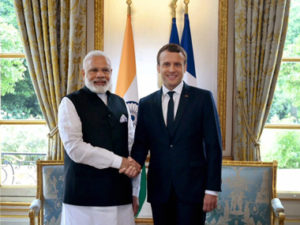
India and France have announced a broad and strategic space cooperation agreement to guide their developing bilateral strategic partnership. This Joint Vision for Space Cooperation includes both existing and new joint mechanisms, with inter-agency representation led by the Indian Space Research Organization (ISRO) and the French National Space Agency (CNES) respectively. The progress and outcomes will be reported to the bilateral Indo-French Strategic Dialogue for review and assessment.
The Joint Vision for Space Cooperation will focus on the following areas of cooperation:
- Bringing societal benefits of space technology by cooperating in remote sensing of the Earth using satellites, including joint development of advanced instruments, joint missions to study weather and climate, and sharing of observation data meant for meteorology, oceanography, resource inventory and cartography, as well as the sharing of expertise in data analysis.
- Partnering to develop and undertake a joint Earth observation mission with high resolution imaging capability in optical and microwave domains.
- Ongoing space domain and situational awareness, as reported by SpaceWatch.Global earlier this week, via collaboration between ISRO and CNES to design and develop joint products and techniques, including those involving Automatic Identification System (AIS), to monitor and protect the assets in land and sea. In particular, both sides will pursue the study of a constellation of satellites for maritime surveillance and cooperate to protect their respective space based assets. India and France will also develop a wider dialogue on space situational awareness (SSA).
- Addressing global challenges, including climate change, through joint missions, advanced processing tools, and mobilizing expertise and resources from other spacefaring countries.
- Cooperation in satellite navigation and related technologies by sharing expertise.
- Exploration of the solar system and beyond via working together on:
- Autonomous navigation of rovers on the Moon, Mars, and other planets and celestial bodies;
- Aero-braking technologies for planetary exploration;
- Modeling of Mars and Venus atmospheres; and,
- Inflatable systems for the exploration of Venus.
- The aim is that both countries can embark on joint, complex, and high-technology space science and planetary exploration missions in the future.
- Cooperation on space transportation systems by collaborating, in accordance with Indian and French international commitments, on the development of:
- Technologies for a liquid Oxygen-Methane propulsion engine;
- Reusable launch vehicles (including common experiments on RLVs); and,
- Special materials, nanomaterials, advanced composites, polymers, chemicals, nanotechnologies, and manufacturing technologies.
- Developing technologies for human exploration of the universe through jointly developing capabilities and critical technologies addressing:
- Radiation shielding solutions;
- Personal hygiene and waste management systems; and,
- Design of human-in-the-loop simulators for human spaceflight as well as bioastronautics.
- Cooperation on international space issues as active players within the United Nations and other forums, and remaining consistent with their international commitments, France and India plan to cooperate regularly on issues including space security, safety of operations, and sustainability.
India and France share a unique historical partnership in the peaceful uses of outer space. Cooperation and collaboration have been hallmarks of this relationship as these two countries have emerged as important spacefaring nations and strategic partners in the geopolitics and security of the Indian Ocean Region (IOR).


